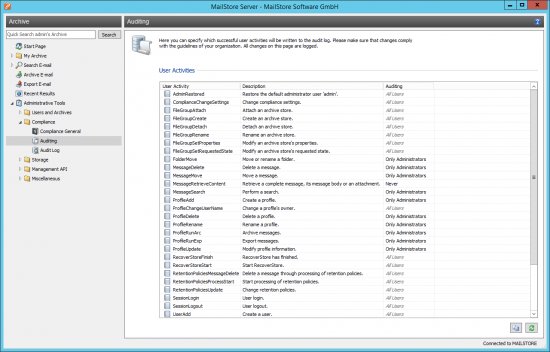Difference between revisions of "Auditing"
| [quality revision] | [checked revision] |
| Line 1: | Line 1: | ||
With MailStore Server, specific events can be written into MailStore's own audit log or the | With MailStore Server, specific events can be written into MailStore's own audit log or the | ||
| − | Windows event log, allowing you to track the activities of both MailStore administrators and users. This enables a company's compliance officer, for example, to | + | Windows event log, allowing you to track the activities of both MailStore administrators and users. This enables a company's compliance officer, for example, to monitor compliance with legal and operational regulations. |
== Specifying the Audit Log Destination == | == Specifying the Audit Log Destination == | ||
| Line 7: | Line 7: | ||
== Changing the Auditing Settings == | == Changing the Auditing Settings == | ||
| − | Under ''Administrative Tools > Compliance > Auditing'' you can configure which user activities should be logged by MailStore. | + | Under ''Administrative Tools > Compliance > Auditing'' you can configure which user activities should be logged by MailStore. Activities performed by MailStore administrators will always be written into the audit log. |
To change the auditing settings, please proceed as follows: | To change the auditing settings, please proceed as follows: | ||
| Line 14: | Line 14: | ||
* From the list, select the event whose auditing status you would like to change. | * From the list, select the event whose auditing status you would like to change. | ||
| − | * Change the auditing status | + | * Change the auditing status via the drop-down list. |
| − | Activities that can only be performed by MailStore administrators are listed | + | Activities that can only be performed by MailStore administrators are listed with the auditing status ''All Users'' that cannot be changed. |
Please note that some events (e.g. <code>MessageRetrieveContent</code>) may generate a large number of entries in the audit log. Only enable such events if you are sure that you need that information. | Please note that some events (e.g. <code>MessageRetrieveContent</code>) may generate a large number of entries in the audit log. Only enable such events if you are sure that you need that information. | ||
Revision as of 14:51, 28 March 2017
With MailStore Server, specific events can be written into MailStore's own audit log or the Windows event log, allowing you to track the activities of both MailStore administrators and users. This enables a company's compliance officer, for example, to monitor compliance with legal and operational regulations.
Specifying the Audit Log Destination
The destination for logging of audit events can be configured in the MailStore Server Service Configuration. By default, MailStore's own audit log is used which can be viewed under Administrative Tools > Compliance > Audit Log. As an alternative, audit events can be written into the Windows application event log.
Changing the Auditing Settings
Under Administrative Tools > Compliance > Auditing you can configure which user activities should be logged by MailStore. Activities performed by MailStore administrators will always be written into the audit log.
To change the auditing settings, please proceed as follows:
- From the list, select the event whose auditing status you would like to change.
- Change the auditing status via the drop-down list.
Activities that can only be performed by MailStore administrators are listed with the auditing status All Users that cannot be changed.
Please note that some events (e.g. MessageRetrieveContent) may generate a large number of entries in the audit log. Only enable such events if you are sure that you need that information.

